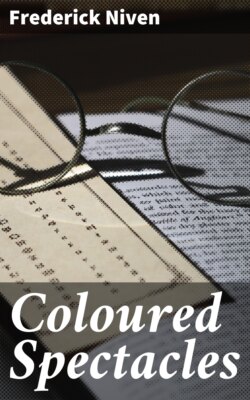Читать книгу Coloured Spectacles - Frederick Niven - Страница 4
На сайте Литреса книга снята с продажи.
I
ОглавлениеTable of Contents
There is a season of the year in the land in which I am writing this, six thousand miles or so from the Grampians, when—to speak in the wild manner of the Psalms, in which we read of the mountains skipping like rams—Scotland comes to me. Upon most days here (in the Upper Country of British Columbia) you could, if you cared, count the trees upon the sky-lines five miles off, but a day arrives when the distances instead of being set in clear and seemingly magnifying crystal are empurpled. You only know, you do not see, that the far mountain sides are clad in pines and firs.
The creeks, tom-tomming in the gulches, clutching wanly at protruding rocks, delaying in trembling amber pools become, in fancy, Highland burns in their glens. Kootenay Lake is changed to a Scots loch. A stipple of rain is on the polished water; the hazed slopes, seen through that smoor, might be of heather, with a birchwood yellowing here and there. Nothing is asked of imagination save to turn the odour of wood-smoke to that of peat—and the trick is done. All Scotland is mine then, from forsaken St. Kilda and the roar and crumble of the Atlantic on its cliffs to the piping of a piper, on a Saturday night, by the Broomielaw.
The Broomielaw! When, I wonder, is James Bone going to give us The Perambulator in Glasgow? The voices of Glasgow buddies in exile demand it. It would be the perfect book for that season here in which I relive the old Glasgow days, the days when W. Y. Macgregor, Arthur Melville, Joe Crawhall, Roche, Lavery, Christie and Guthrie, Harrington Mann, D. Y. Cameron and Walton, George Henry and Hornel had shown—shown yet again, for they had great painting predecessors there, though these had appeared more singly than en masse—that out of an industrial city art could come, and Charles Rennie Mackintosh was making the walls, the ceilings, the floors, the chairs, the tables, and the very spoons of the tea-shops of Miss Cranston memorable.
There was a small paper-covered guide to "doon the watter" on sale then at the station bookstalls and hawked on the streets. It was illustrated with reproductions of pen-and-ink drawings. Was I right in thinking them works of genius? I showed it to my chosen mentors, trustful of confirmation, and, "Muirhead Bone," they said at a ratifying glance. I fancy that must have been his first published work. It is a rarity now, I suppose. One of the regrets of my life is that my copy has disappeared from the portfolio in which I kept such treasures. (It was on sketching-blocks, not writing-pads, that I first thought to appease the inherent whim to portray, to communicate, what I saw.) There was a spirit of renaissance in Glasgow then—as now. The very flames of Dixon's Blazes over our city were as banners of proclamation.
